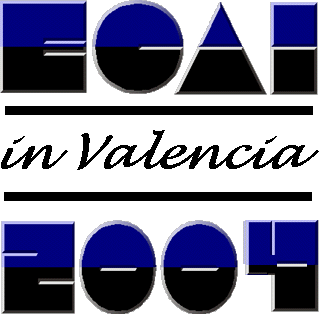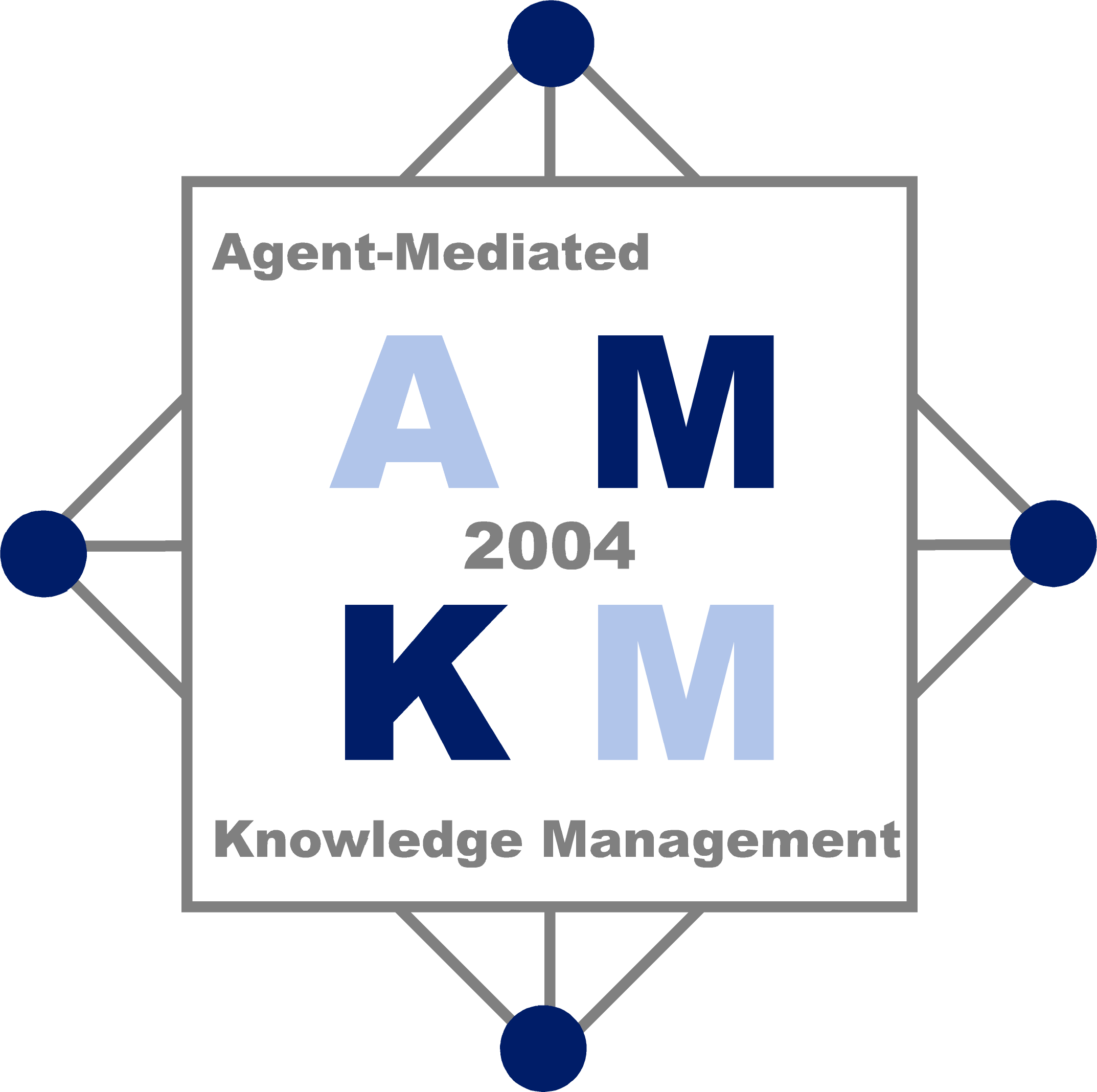 |
|
 |
Call for Papers
ECAI 2004
Workshop
on
Agent-Mediated Knowledge Management (AMKM-04)
August 22-27, 2004, Universidad Politécnica de Valencia (Spain)
Deadlines & Submission Format
| Submission of papers | 01. April 2004 |
| Author notification | 01. May 2004 |
| Camera
ready papers |
01. June 2004 |
We invite the electronic submission of technical papers adhering to the ECAI main conference layout instructions which can be found here:
http://www.dsic.upv.es/ecai2004/cfp/style/style.html
Full papers should have a length of up to 10 pages and should be sent in PDF format by e-mail to elst@dfki.de.
Those interested in participating without a full paper should send a two-page extended abstract or statement of interest describing their AMKM-related work and areas of interest. Statements of interest may discuss work in any stage of development, from concepts and future directions up to finished work. Please use the full paper template also for preparing extended abstracts. We explicitly invite system demonstrations which might be announced / accompanied by either a full paper or an extended abstract.
Motivation
Knowledge Management (KM) is a predominant trend in business in the recent years. It is not only an important field of application for AI and Semantic Webtechnologies, such as CBR for Intelligent Lessons-Learned Systems, or Text Classification for Information Push services; it also provides new challenges to
the AI community, like context-aware knowledge delivery. Scaling-up research prototypes to real-world solutions usually requires an application-driven
integration of several basic technologies, e.g., ontologies for knowledge sharing and reuse plus collaboration support like CSCW systems, and personalized
information services. Typical characteristics of such an integration are:
- manifold logically and physically dispersed actors and knowledge sources,
- different degrees of formalization of knowledge,
- different kinds of (web-based) services and (legacy) systems,
- conflicts between local (individual) and
- global (group or organizational) goals.
gathering, intelligent information integration, or personal information agents, are established techniques in this area. In order to cope with the inherent complexity
of a more comprehensive solution, the concept of Agent-mediated Knowledge Management (AMKM) deals with collective aspects in an attempt to cope with the conflict between desired order and actual behavior in dynamic environments.
AMKM introduces a social layer, which structures the society of agents by defining specific roles and possible interactions between them.
In this workshop we invite contributions which illustrate methodological, technical and application aspects of Agent-mediated Knowledge Management. Topics of interest include:
- Methodology for AMKM
- Analysis and Design Methods for AMKM Systems
- Relationship between AMKM and Agent-oriented Software Engineering
- Relationship between AMKM and Business Engineering Methods
- Functionalities in AMKM Systems
- Distributed Organizational Memories
- Ontology Negotiation and Ontology Lifecycle Management
- Agents for Group Formation and Awareness
- Agents for Supporting Social Processes (Trust, Reputation)
- Agent-based Workflow in the KM Context
- Collaborative Information Retrieval
- Emergent Semantics and Pervasive Semantics
- Implementation of AMKM Systems
- Architectures and Platforms for Socially Enabled Agents
- Distributed KR&R for Socially Enabled Agents
- Semantic Web methods for AMKM
- User Modeling for Agent Mediated Social Processes
- Human-Computer Interaction in AMKM (Ontology Visualization, Web Design Guidelines for Knowledge Navigation, User Interfaces for KM)
- Practical application examples for (aspects of) AMKM systems
- Basic Research Questions for AMKM
- Benefits and reasons for the application of the agent paradigm to KM
- Organizational implications of agent use in KM (e.g., with respect to risks and responsibilities)
- Formal models for AMKM
- Relationships to other research paradigms like P2P or Grid computing, Semantic Web and Semantic Web Services, or mobile computing and mobile KM
- Evaluation of KM and AMKM systems
Predecessor Event
The first AMKM workshop (AMKM-2003) was organized as a AAAI Spring Symposium atStanford University. Revised and additional papers (including an introduction /
overview on AMKM) are available as Volume 2926 of the Springer LNAI Series.
Workshop Organizers
Andreas AbeckerForschungszentrum Informatik (FZI) Karlsruhe
Haid-und-Neu-Str. 10-14, D-76131 Karlsruhe, Germany
Phone: ++49 (0)721 9654 802
Fax: ++49 (0)721 9654 803
E-Mail: abecker@fzi.de
Ludger van Elst
German Research Center for Artificial Intelligence (DFKI) GmbH
Knowledge Management Department
Postfach 2080, D-67608 Kaiserslautern, Germany
Phone: ++49 (0) 631 205 3474
Fax: ++49 (0) 631 205 3210
E-Mail: elst@dfki.de
Virginia Dignum
University of Utrecht, Intelligent Systems Group
P.O. Box 80089, 3508 TB Utrecht, The Netherlands
Phone: ++31 (0) 30 253 4432
Fax: ++31 (0) 30 351 3791
E-Mail: virginia@cs.uu.nl
(preliminary) Program Committee
Jürgen Angele, University of Innsbruck & Ontoprise GmbHPaolo Bouquet, University of Trento
Rose Dieng, INRIA, Sophia-Antipolis
Fabien Gandon, INRIA Sophia Antipolis
Renata Guizzardi, University of Twente
Grigoris Mentzas, National Technical University of Athens
Pietro Panzarasa, Queen Mary University of London
Anna Perini, ITC-IRST
Thomas Roth-Berghofer, DFKI
Franz Schmalhofer, University of Osnabrück
Stefan Schulz, TU Berlin
York Sure, University of Karlsruhe
Walt Truszkowski, NASA Goddard Space Flight Center
Gerard Vreeswijk, University of Utrecht
